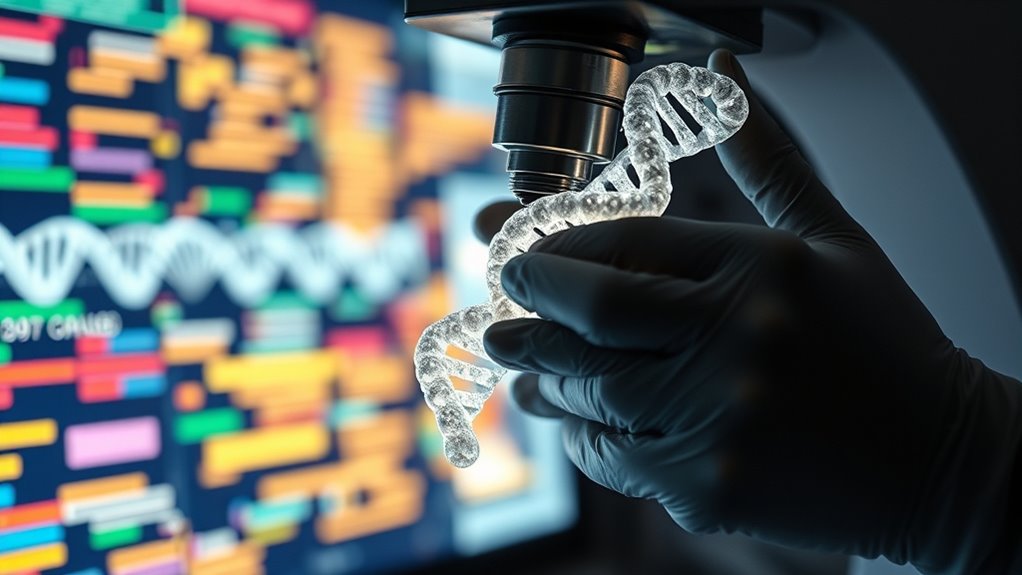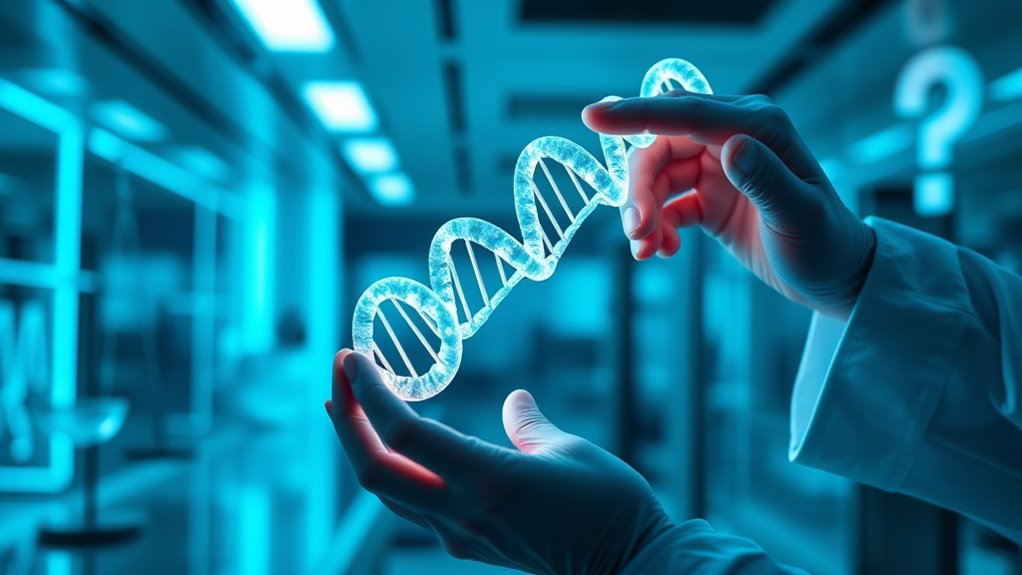CRISPR gene editing offers incredible possibilities but also raises important ethical questions. You need to contemplate concerns about manipulating human genes, privacy risks, and potential misuse by those with bad intentions. It’s essential to think about moral boundaries, such as editing for non-medical traits, and the risk of creating inequality. By exploring these issues further, you’ll better understand the responsible ways to navigate this powerful technology and its societal impacts.
Key Takeaways
- Defining ethical limits for gene editing to balance therapeutic benefits and prevent non-medical enhancements.
- Ensuring robust regulations to protect genetic privacy and prevent misuse or discrimination of personal genetic data.
- Addressing moral concerns around “playing God” and the potential societal impact of editing human embryos.
- Assessing risks of off-target effects and establishing responsibility for unintended genetic consequences.
- Promoting societal dialogue to develop consensus on acceptable applications and establish moral boundaries.

CRISPR gene editing has revolutionized the way scientists can modify DNA, offering a powerful tool to precisely target and alter genetic sequences. This breakthrough opens up incredible possibilities for curing genetic diseases, enhancing crops, and advancing biological research. However, it also raises serious ethical questions that you need to contemplate, especially around issues like genetic privacy and moral boundaries. When you manipulate DNA, you’re not just changing genes; you’re potentially affecting personal identities and future generations. This brings up concerns about who has access to genetic information and how it’s protected. Genetic privacy becomes a critical issue because your DNA contains sensitive information that could be exploited if it falls into the wrong hands. Biotech companies, governments, or malicious actors might misuse genetic data for discrimination, unauthorized research, or even genetic profiling. You must ask yourself: How do we safeguard this information? What rights do individuals have over their genetic data? These questions underscore the importance of establishing strict regulations to prevent unauthorized access and misuse. Additionally, the potential for ethical dilemmas increases as the technology advances, requiring ongoing societal dialogue and regulation.
At the same time, you face moral boundaries that challenge the limits of what’s acceptable with CRISPR technology. The line between therapeutic and enhancement purposes can blur, leading to debates about “playing God.” Should you be allowed to edit genes to eliminate diseases? Absolutely. But what about editing for non-medical reasons, like increasing intelligence or physical traits? Such actions could create a new class divide or lead to unintended social consequences. It’s essential that you consider whether there are moral limits to designing future humans. These boundaries aren’t just about legality—they’re about ethics and respect for human dignity. You must also think about the risks of off-target effects, where unintended parts of the genome are altered, potentially causing harm. This raises questions about responsibility and accountability. If a genetic modification leads to unforeseen health issues or ethical dilemmas, who bears the responsibility?
As you navigate the rapidly evolving landscape of CRISPR, you need to balance innovation with caution. The potential benefits are enormous, but so are the risks. Protecting genetic privacy and respecting moral boundaries aren’t just legal or scientific issues—they’re fundamental to maintaining trust and integrity in this transformative field. Ultimately, your choices today will shape the future of genetic engineering and influence how society perceives and manages these powerful tools.
Frequently Asked Questions
Can CRISPR Be Used to Edit Human Embryos Legally?
You wonder if CRISPR can be used to edit human embryos legally. Currently, germline modifications raise significant ethical consent issues, making many countries restrict or ban such practices. While some researchers push for legal approval, most regulations demand thorough ethical review before proceeding. So, until policies are clarified and ethical concerns addressed, using CRISPR on human embryos remains largely illegal and ethically debated worldwide.
What Are the Risks of Unintended Genetic Mutations?
Have you considered the risks of unintended mutations when using CRISPR? Off-target effects can cause unintended genetic changes, leading to unpredictable health issues. Mosaicism, where only some cells are edited, may result in inconsistent traits or hidden health problems. These risks highlight the importance of thorough testing and caution before proceeding, as even small errors could have significant long-term consequences for individuals and future generations.
How Accessible Will CRISPR Technology Be Worldwide?
You might wonder how accessible CRISPR technology will be worldwide. Currently, equity disparities and technological accessibility pose challenges, making it less available in low-resource regions. As the technology advances, efforts are needed to reduce costs and share expertise globally. If these barriers are addressed, more people could benefit from CRISPR, promoting fairness and innovation across diverse communities. However, without equitable access, disparities could widen further.
Could CRISPR Be Used for Non-Therapeutic Enhancements?
You might wonder if CRISPR could be used for non-therapeutic enhancements, like creating designer babies. If so, it could increase genetic inequity, where only the wealthy access such modifications, deepening societal divides. This use raises ethical concerns about fairness and the potential for unintended consequences. While the technology offers incredible potential, carefully regulating its application is vital to prevent misuse and guarantee equal opportunities for all.
What Regulations Currently Govern CRISPR Research Globally?
You might find it surprising how regulations for CRISPR research vary globally, often reflecting differing priorities and ethical standards. Countries like the US and China have guidelines focusing on safety and ethical considerations, but enforcement and scope differ. Intellectual property rights influence research access, while increased public awareness pressures governments to establish clearer policies. Staying informed helps you understand how these regulations shape the future of gene editing.
Conclusion
As you consider the power of CRISPR, remember that scientists estimate it could eliminate up to 90% of genetic diseases. This staggering number highlights both the incredible potential and the ethical dilemmas you face. Will you harness this technology for good, or risk unintended consequences? It’s up to you to weigh the benefits against the risks, ensuring that advancements serve humanity responsibly. The choice is yours—shape the future with wisdom and care.









